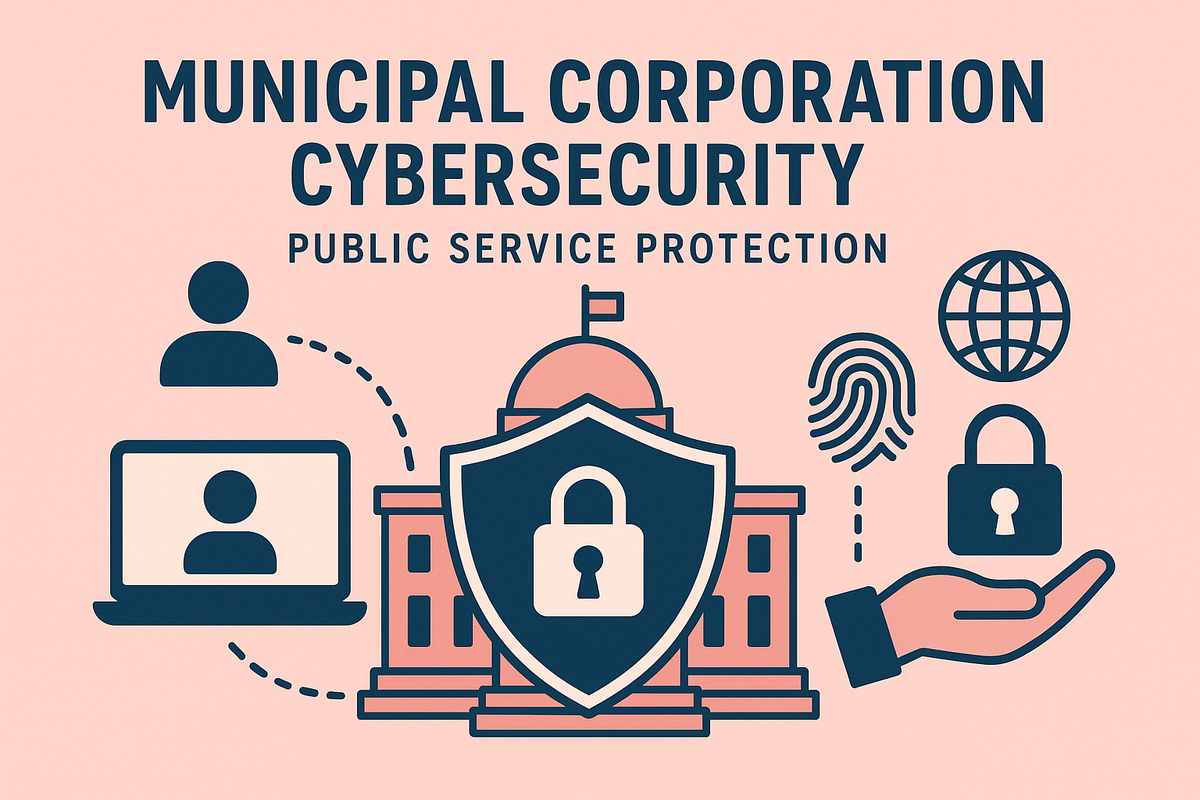Municipal Corporation Cybersecurity: Public Service Protection

Introduction
Municipal corporations across India have rapidly digitized public services, transforming governance, civic engagement, and urban infrastructure management. However, this digital evolution increases exposure to sophisticated attacks targeting citizen databases, city utilities, and e-governance platforms. Robust cybersecurity for these entities is now critical to safeguarding public trust and vital services.
The Role of Municipal Corporations in Public Cybersecurity
Municipal corporations play a central role in deploying citizen services—from water supply and waste management to digital records and emergency notifications. These services increasingly depend on interconnected IT systems, IoT networks, and cloud platforms, each presenting its own vulnerabilities that, if exploited, can disrupt daily life and erode public confidence.
National Cybersecurity Directives and Municipal Implementation
India’s cybersecurity administration is multifaceted, involving the National Critical Information Infrastructure Protection Centre (NCIIPC), Indian Computer Emergency Response Team (CERT-In), and the Ministry of Housing and Urban Affairs (MoHUA). Up-to-date guidelines now:
- Mandate municipality-wide cybersecurity frameworks and the appointment of Chief Information Security Officers (CISOs).
- Require annual audits and compliance checks of public service systems.
- Emphasize real-time threat intelligence, vulnerability management, and inter-agency collaboration, leveraging national hubs for cyber incident notifications and defense coordination.
Evolving Threat Landscape for Urban Public Services
Municipal entities face rising risk from:
- Ransomware and malware targeting e-governance platforms, utility controls, and surveillance infrastructure.
- Data breaches involving citizen identities and financial records.
- Insider threats from unmanaged privileged access and weak identity controls.
- Third-party risk and supply chain vulnerabilities in outsourced digital services.
Municipal Cybersecurity Strategy: Architecture and Best Practices
Effective protection for city services hinges on a layered strategy:
- Network segmentation and endpoint security for critical systems.
- Role-based access control and multi-factor authentication for staff and contractors.
- Continuous auditing and centralized monitoring for detecting configuration changes and anomalies.
- Strong encryption, robust backup, and regular penetration testing of city IT assets.
CERT-In and MoHUA stress baseline operational controls, annual audits, and software patch management across all domains—networks, application, data, third-party outsourcing.
Mandatory Appointment of CISOs in Cities
From 2025 onwards, every Indian city has been mandated to appoint a Chief Information Security Officer (CISO), responsible for:
- Overseeing robust cyber defense for city functions.
- Coordinating across central, state, and local government layers.
- Driving awareness, policy enforcement, and cross-agency collaboration for cyber resilience.
- Addressing the growing skill gap in cybersecurity by fostering local talent and training.
Cybersecurity Audits and Incident Response Preparedness
Regular audits are vital to detect vulnerabilities before they are exploited. Incident readiness plans should:
- Define clear escalation steps for breaches, service outages, and fraud.
- Use real-time monitoring, rapid reporting, and coordinated response teams.
- Leverage CERT-In and local partners for incident analysis, containment, and recovery.
Sectoral Insights: Public Utilities, Health, and Urban Services
Municipal cybersecurity extends across:
- Utility grids, including water, electricity, and sanitation—often targeted for disruption.
- e-Health platforms and digitized patient records demanding the highest privacy controls.
- Smart city IoT deployments and integrated control centers, requiring constant defense against malware and physical tampering.
Data Privacy and Citizen Trust
Trust in city services rests on transparent data protection and privacy:
- Encryption and anonymization of personal and operational data.
- Public communication about data usage, retention, and protection policies.
- Data minimization and “privacy by design” for new municipal service rollouts.
Challenges and Opportunities Ahead
Despite regulatory progress, cities face hurdles:
- Persistent skill gaps, with the country needing over one million cybersecurity professionals for city and smart infrastructure defense.
- Budget limitations, legacy IT systems, and coordination challenges between multiple government layers.
- Increasing AI- and IoT-driven threats requiring new response models and cross-sector partnerships.
Conclusion
Municipal corporation cybersecurity is foundational to public service reliability and citizen confidence. Success relies on up-to-date standards, continuous talent development, holistic incident readiness, and an adaptive security culture driven by regulatory and community engagement. Strong leadership, technology modernization, and relentless vigilance will define the future of India’s municipal public service protection
Take the Next Step with CodeSecure Solutions
Cyber threats are growing more sophisticated every day. With a trusted partner by your side, you can safeguard your business while focusing on what truly matters—growth and innovation.
At CodeSecure Solutions, we deliver comprehensive cybersecurity services in Chennai, uniquely tailored for startups, SMEs, and enterprises:
- Vulnerability Assessment & Penetration Testing (VAPT)
- Network Security Solutions
- Compliance Support (ISO 27001, PCI-DSS, HIPAA, DPDP Act, GDPR)
- Cloud & Endpoint Protection
- Security Awareness Training
No matter your industry or size, CodeSecure customizes solutions to fit your needs—ensuring your data, reputation, and operations remain secure.
Ready to Strengthen Your Defenses?
- 📞 Call: +91 73584 63582
- ✉️ Email: vapt@codesecure.in
- 🌐 Visit: www.codesecure.in
Stay secure. Stay informed. Choose CodeSecure Solutions—your partner in cyber resilience.
